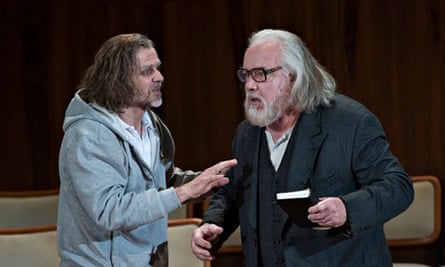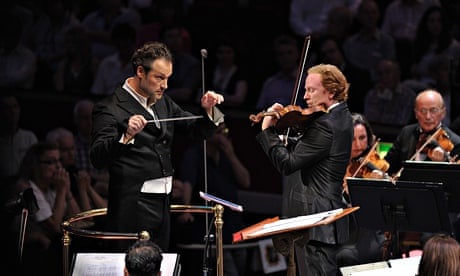When the 2014 Proms season was announced, a few eyebrows rose at the news that several unfamiliar orchestras from far afield would feature. One reason given was that the countries represented may hold the key to the future of classical music. Thirty million children learning the piano in China remains a jaw-dropping statistic even if you're also stifling a yawn at hearing it yet again. These orchestras also come cheaply compared to the world's leading US or European ensembles. So global philanthropy, or harsh economics?
Banish all doubts. The presence of these emerging orchestras is proving addictive, opening our ears to other traditions and offering surprise and pleasure. First came the China Philharmonic, charming, idiosyncratic, a little stiff musically yet bursting with personality. Then this week the exciting Borusan Istanbul Philharmonic Orchestra arrived, with their charismatic chief conductor, Sascha Goetzel (Prom 16).
This bendy, baton-twirling Austrian, with his twists, thrusts, flops, pirouettes, gyrations and genuflections, turns the podium into his own personal dancefloor. That description may sound hideous, but this wonderful showman is mesmerising and achieves first-rate results. He managed to transform Respighi's otiose ballet suite, Belkis, Queen of Sheba, with its "warlike and savage dance" and full-blown orgy, into a captivating boogie-woogie. It was a first for the Proms, and for me too. While I hope never to hear it again, it will not be for want of a thrilling performance.
Goetzel evidently trains as well as inspires his players, over 90% of whom are Turkish. Their average age is around 40, and the orchestra itself, growing out of an existing chamber orchestra, only gave its first concert in 1999, supported by the Turkish steel pipe manufacturers Borusan Holding. (Wake up, Centrica.) Already the strings are warm-toned and secure, the woodwind and brass outstanding, as their recently released disc of Rimsky-Korsakov's Scheherezade demonstrates.
Mixing occident and orient as you might expect, the Prom included Holst, Balakirev and Handel (a breezy, fleet account of The Arrival of the Queen of Sheba in Beecham's arrangement), with a world premiere, Violin Concerto No 1, "1914" by Gabriel Prokofiev (b 1975), as the centrepiece. A BBC commission, it was written for Daniel Hope, who suggested the piece be linked to the centenary of the first world war.
The four-movement work springs few surprises in terms of orchestral or solo textures, which are clear, easy to hear and always generous to the lyrical qualities of the violin. The fascination comes in the vivid use of percussion, beginning with hushed snare drums and ghostly woodwind blowing into their instruments without making notes. The first instruction in the score is "One hundred years away. We can barely hear those distant souls." Whip, thunder sheet, hammer and various bells and tam-tams create the sound of war, often as if through a veil.
The violin's broad, opening theme is a distant echo of the march in Stravinsky's The Soldier's Tale (1918). With its gunshots and explosions, the work may feel programmatic but it tugs at bigger ideas, especially with Hope as the eloquent soloist, making his 1742 Guarneri del Gesù sing out. This violinist, now among the best in the world as well as the most thoughtful, is as brilliant at Bach as Birtwistle and even Einaudi.
Prokofiev, London-born grandson of Sergei, is equally versatile. He had a classical training then switched to electronic, dance, house and hip-hop, founding the independent Nonclassical label and club in 2004. His Concerto for Turntables went down a storm at the National Youth Orchestra's Prom in 2011. This latest concerto, perhaps overlong but with several "optional cuts" marked in the score, is yet another new departure. Watch this uplifting concert on BBC4 on Sunday 31 August.
Two other BBC commission world premieres (heard on Radio 3) made contrasting impressions. In Simon Holt's Morpheus Wakes (Prom 14), the shape-shifting god of dreams takes flight through the virtuosic solo playing (using an alto instrument too) of flautist Emmanuel Pahud, with a spare, pellucid accompaniment from the BBC National Orchestra of Wales conducted by Thierry Fischer. Jonathan Dove's Gaia Theory, for the BBC Symphony Orchestra under Josep Pons (Prom 15), engaged with that holistic theory of the universe developed by James Lovelock in the 1960s. This idea of natural continuum was mirrored in Dove's dancing, pulsating, energetic score, which ended not with a bang but with a shimmering gong. One other Prom highlight: the lithe, often mannered but wonderfully sung account of Bach's St John Passion (Prom 12) by the Zürcher Sing-Akademie and Zurich Chamber Orchestra conducted by Roger Norrington, with James Gilchrist (Evangelist) and Neal Davies (Christus) leading the soloists. It worked in the hall, but it may be even better on iPlayer.
The main season is over, but for Welsh National Opera an important date remained: its first annual visit to the Royal Opera House, part of a new collaboration. They brought their trickiest triumph: Schoenberg's unfinished masterpiece, Moses und Aron, with John Tomlinson and Rainer Trost in the title roles, superbly conducted by Lothar Koenigs with the WNO chorus and orchestra, as ever, on glowing form.

Inspired by the Old Testament and written in 1930-32 when Schoenberg was preoccupied with his Jewish identity (he had converted to Protestantism), the opera debates belief in an invisible God. Moses, powerful but inarticulate, looks to his brother Aron, facile with words, to help lead his people out of Egypt at God's command. Tomlinson, spellbinding in his struggle, tragic in his torment, delivered this Sprechstimme role – half speech, half song – with natural authority. Trost, with his smiling bonhomie and Blair hugs, was equally convincing.
First seen in Stuttgart, Jossi Wieler and Serge Morabito's updated production is set first in a parliament chamber, then in a cinema in which the golden calf rave-up is, apart from some mild canoodling, blessedly watched on an invisible screen. Given how embarrassingly laborious most stage orgies are, it was a smart, and I hope trend-setting, move to leave it all to our imaginations.

Comments (…)
Sign in or create your Guardian account to join the discussion